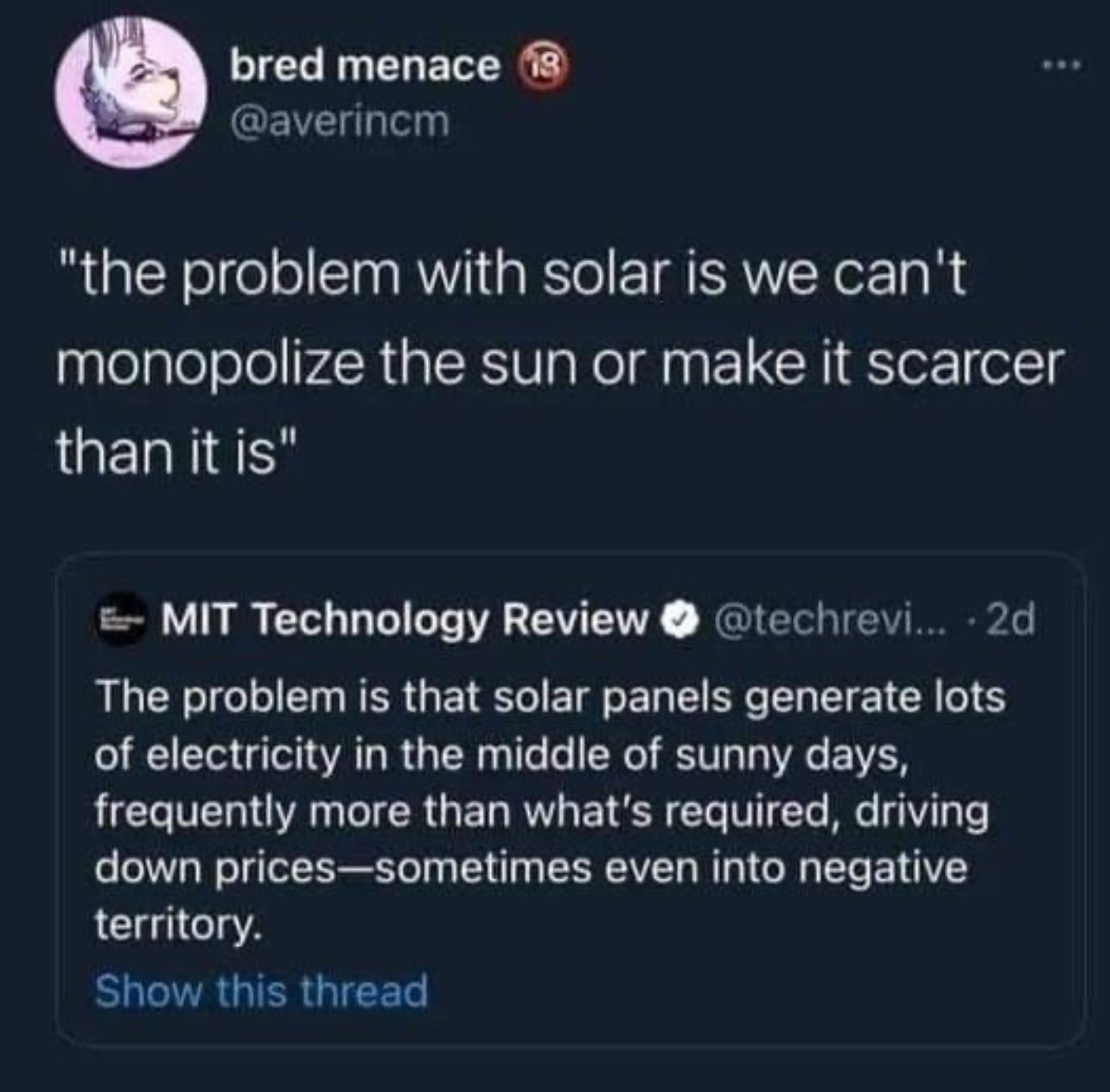this post was submitted on 02 Oct 2024
1701 points (95.6% liked)
Microblog Memes
7466 readers
1570 users here now
A place to share screenshots of Microblog posts, whether from Mastodon, tumblr, ~~Twitter~~ X, KBin, Threads or elsewhere.
Created as an evolution of White People Twitter and other tweet-capture subreddits.
Rules:
- Please put at least one word relevant to the post in the post title.
- Be nice.
- No advertising, brand promotion or guerilla marketing.
- Posters are encouraged to link to the toot or tweet etc in the description of posts.
Related communities:
founded 2 years ago
MODERATORS
you are viewing a single comment's thread
view the rest of the comments
view the rest of the comments

Hydrogen is troublesome as an energy storage. The roundtrip efficiency (electricity -> hydrogen -> electricity) is just... very not worthwhile compared to batteries. Then beyond efficiency there is still the question of "how do we store hydrogen safely?"
Storing energy indefinitely is not a problem for electricity storage, since we are pretty much guaranteed to use the stored energy up in a single day.
Yep. When you're using the energy quickly, within days or weeks, then hydrogen is extremely impractical.
The merits of hydrogen are in long term storage and cycles. A well built storage tank can last a lifetime. To be fair, a poorly built one might not last a year... So it's very dependent on the external factors involved.
Batteries have their flaws, which I think we all know by now. Weight (regardless of state of charge), volume (energy density), charging speed, cycle life, etc.
It's all about the application. Is the energy storage method going to be efficient for the desired outcomes.
Regardless of what other outcomes are in play, one that should be constant is to preserve the environment. Lithium technologies have reached a high level of development in recycling, so, for the most part, the environmental impact of end-of-life batteries is effectively mitigated to a large extent. This is a great thing that we have developed.
We need to do the same with solar PV panels, and mitigate as much of the environmental impact as we can from that as well. I know that's something that's being worked on, but we're not at the same level of efficiency as we are with batteries, probably due to the comparatively long life of PV panels, vs the comparatively short lifetime of lithium cells. We've simply had a lot more lithium to deal with and find ways to recycle, so far. I'm sure PV panels recycling will come along as more early adopters upgrade to something newer, and more panels get into the stage where they need to be recycled. I haven't checked in on PV panel recycling in a while so I'm not sure how outdated my information is.
To be clear, I am not, have not, and would never suggest that we move all our efforts into any technology, including, but not limited to, lithium, solar, wind, hydrogen, or anything else that's been discussed. IMO, we need to leverage several technologies to achieve our long-term goal of global net zero, while meeting the energy demands of everyone.
I just feel like hydrogen is treated like a dead end technology, and I can't blame the public for thinking so. A lot of the information about it as an energy storage solution is either very old, or still in its infancy. From electrolysis, which is a very old idea, to hydrogen fuel cells, which are extremely new by comparison. IMO, there's a lot of work that can be done here, and we need to keep looking into it. Maybe it goes nowhere, maybe it becomes so practical that other solutions seem like shit by comparison. I don't think either of those is likely, we'll probably land somewhere in the middle of those extremes. I don't know, and I'm not a scientist, so I'm just hoping we, as a society of people, keep working on it.
One thing I'm particularly excited for in this field is solid state batteries. But that's also in its infancy. I know a lot of work is being done on them, so we'll see what happens.
My point, if I have any point at all, is that we need to keep researching varied technologies for it. While solid state might be the right answer for EVs, and cellphones and most consumer electronics, they might not be the best solution for other applications. We need answers to energy demands of all sorts and giving up on something like hydrogen when there's still research to be done, isn't a great idea. We don't know what researching a technology could uncover. Maybe an air battery that's hyper efficient and has a high energy density, better than solid state technologies could hope to achieve. Maybe a lot of things. We just don't know.
Let's try everything and figure out what works for what application.